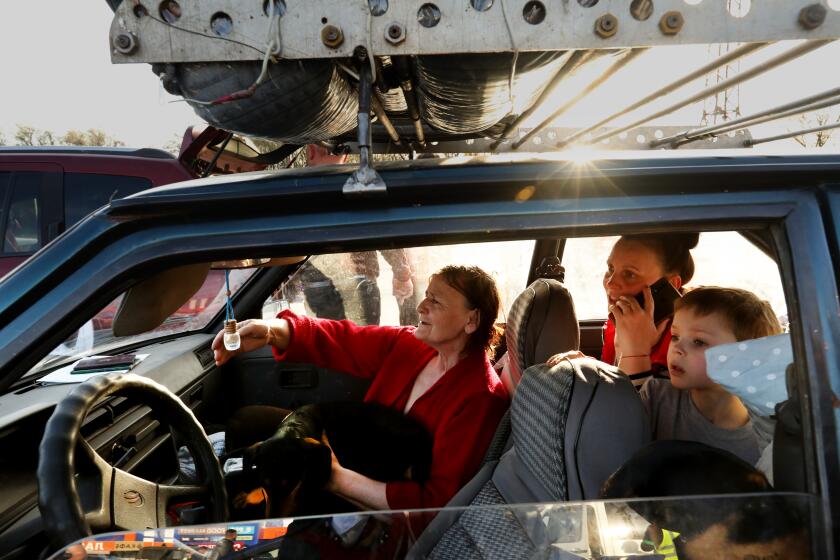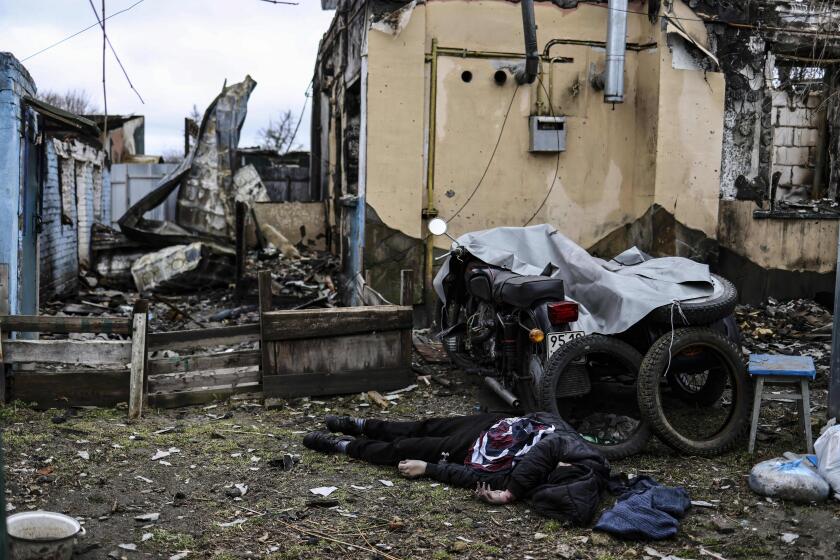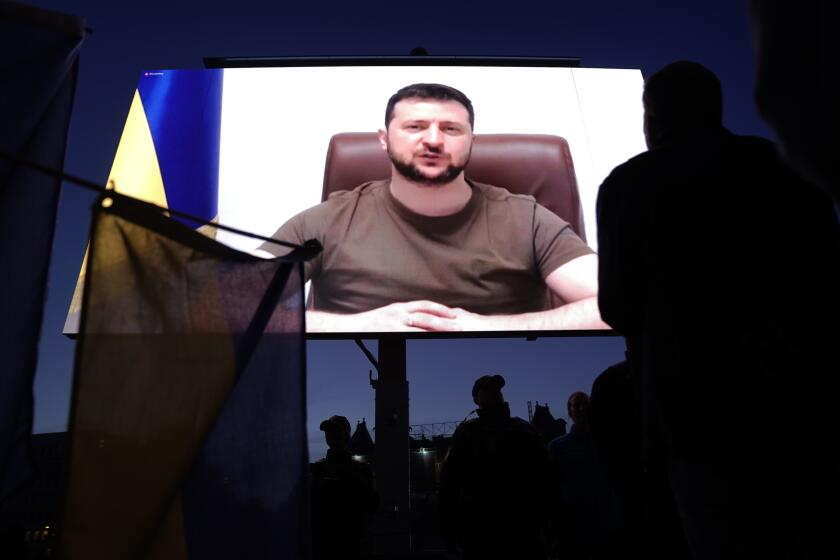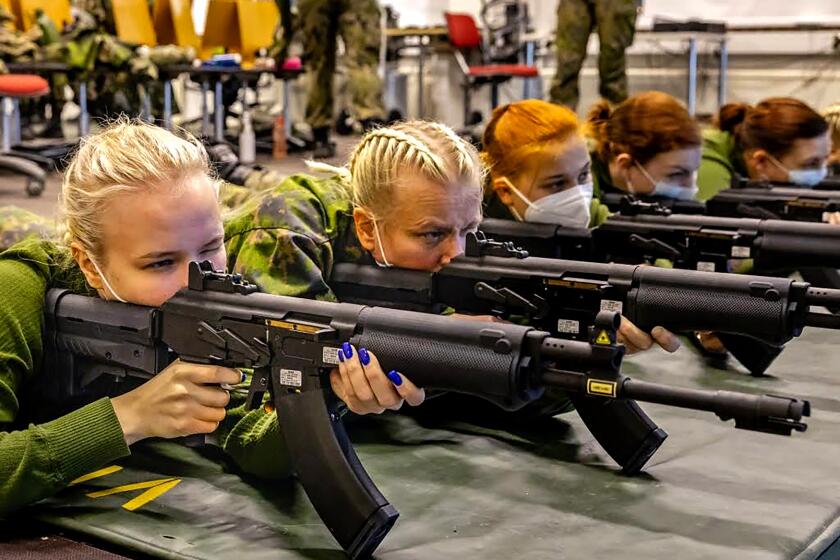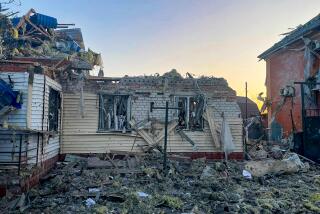First war crimes trial starts in Ukraine as new sanctions target the ‘wallet’ of Putin’s family and friends
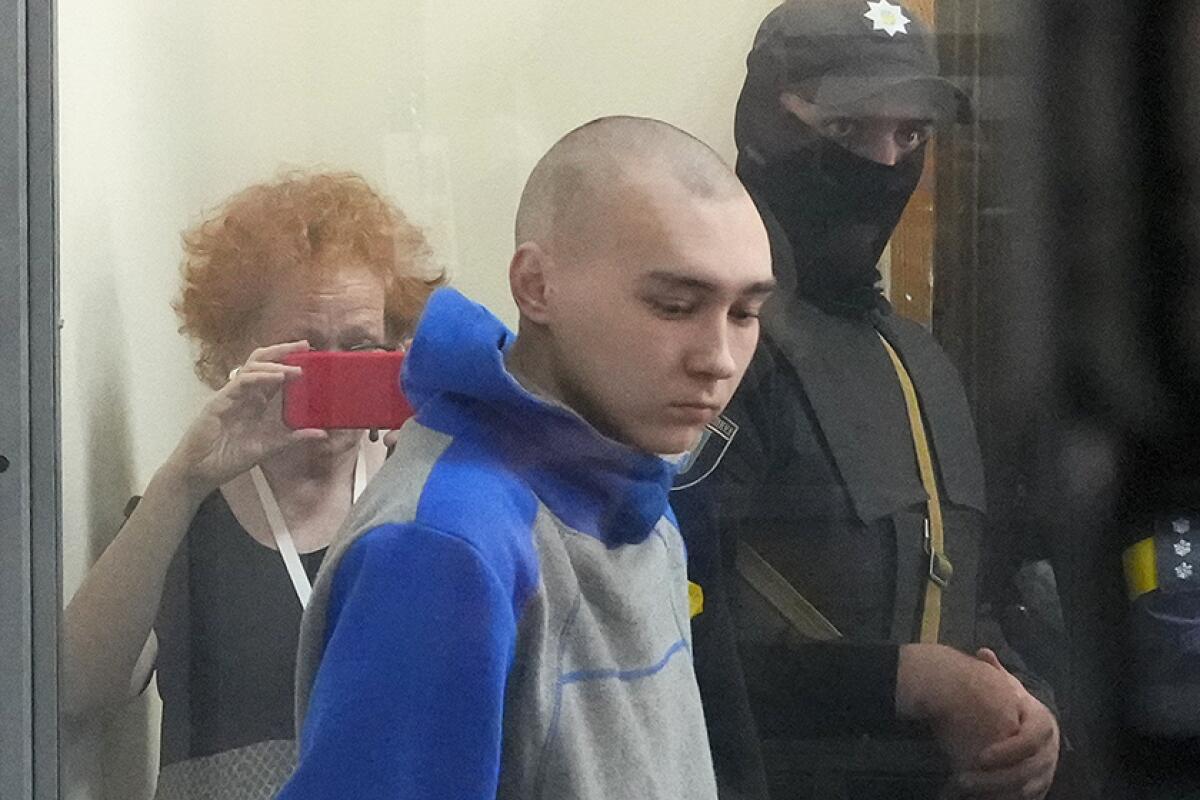
- Share via
KRAKOW, Poland — The trial of a single Russian sergeant opened in Ukraine in what is expected to start a massive prosecution for war crimes in a months-long conflict that on Friday saw fighting rage in the east as Russia appeared to suffer new losses when its forces attempted to breach a key river.
The two top defense officials in the U.S. and Russia, meanwhile, held their first direct communication in nearly three months, but Moscow remained uninterested in Western calls for an immediate cease-fire in a war that has battered cities, left thousands dead, spawned millions of refugees and sparked fears of a global food crisis.
To underscore its resolve, Russian forces aimed a punishing new barrage at areas in the country’s north, east and south, including bombardment of a final Ukrainian redoubt in the shattered southern port of Mariupol.
Repeated attempts by the government in Kyiv to broker a deal to evacuate wounded soldiers from a sprawling steel plant — the last sliver of territory in the city held by Ukrainian forces — have so far failed.
Seeking to intensify Western pressure on Russian President Vladimir Putin, the European Union’s top diplomat, Josep Borrell, said the bloc would soon revisit the notion of an embargo of Russian oil. Hungary has so far resisted such a step, but Borrell expressed the belief that those reservations could be overcome despite worries in Europe of economic hardship.
“We need this agreement, and we will have it,” he said Friday as Group of 7 foreign ministers from wealthy democracies gathered in Germany.
And Britain announced new sanctions targeting the “wallet” of Putin’s family and friends, including his ex-wife as well as his purported mistress, a former Olympic gymnast and mother of his most recent children.
“We are exposing and targeting the shady network propping up Putin’s luxury lifestyle and tightening the vice on his inner circle,” British Foreign Secretary Liz Truss said. “We will keep going with sanctions on all those aiding and abetting Putin’s aggression until Ukraine prevails.”
Amid diplomatic maneuvering and heavy fighting, Ukraine began what was described as the first war crimes proceeding stemming from the nearly 3-month-old invasion. A 21-year-old Russian tank commander appeared Friday in court on charges of shooting an unarmed civilian who was riding his bicycle in a northeastern Ukrainian village.
After staying behind as long as they dare, residents who decide to flee besieged Mariupol find that a long and nerve-racking ordeal awaits.
Ukraine says it is investigating thousands of alleged war crimes as the trial of Sgt. Vadim Shyshimarin, who stood with a shaved head in a glass box, opened in a Kyiv courtroom. The soldier, who was captured by Ukrainian forces, could face life in prison in the shooting of an unarmed 62-year-old civilian man in the northern village of Chupakhiva.
Ukrainian investigators, backed by international experts, have interviewed thousands of witnesses and survivors and collected evidence from mass graves and the sites of shootings.
The Russian retreat from areas near the Ukrainian capital followed weeks of its forces occupying suburbs and satellite towns to Kyiv’s north and west. In their wake, the Russian forces left a trove of evidence of atrocities against Ukrainian civilians, which Moscow denies took place.
Meanwhile, Pentagon officials reported the first telephone contact between the top defense officials in the U.S. and Russia since before the Kremlin’s invasion of Ukraine more than two and a half months ago. U.S Defense Secretary Lloyd J. Austin III spoke to his Russian counterpart, Sergei Shoigu, for about an hour Friday and called for an immediate cease-fire, the Pentagon said, without revealing a response.
“We hope this is a springboard for further communication ... now that they have reconnected,” a senior Pentagon official said. The official, who briefed reporters on condition of anonymity, said Pentagon officials have been regularly seeking to speak with Shoigu or other senior Russian officials with no success.
Weeks after Russian occupation, rural areas outside Ukraine’s capital still yield forest graves. Exhumations remain a near-daily task for police.
As fighting rages in eastern Ukraine, Russian commanders are under growing pressure to make battlefield gains even if it means taking risks that can backfire, a British military intelligence assessment said.
The assessment cited widely viewed video of Russian armored vehicles destroyed during an attempted river crossing, which was posted online by Ukraine’s military. The images could not be independently verified.
Ukrainian troops have managed to push Russian troops away from the country’s second-largest city, Kharkiv, Ukrainian and Western military officials say, more than a month after Russia broke off an attempt to seize the capital, Kyiv.
But Russian forces have slowly taken some ground elsewhere in Ukraine’s eastern industrial heartland, and heavy use of artillery against populated areas is exacting a horrific civilian toll.
Veterans of the Lincoln Project are using lessons learned in 2020 to help Ukraine combat Russian lies and misinformation.
While the front lines have been fluid in some areas, with some villages changing hands repeatedly, clashes along a 300-mile battlefront have been punctuated by some decisive losses and gains. Ukraine’s Defense Ministry said Thursday that more than a dozen Russian armored vehicles were destroyed while trying to cross the Seversky Donets River near the village of Bilohorivka in Luhansk, one of two provinces making up the Donbas region, the war’s main battleground.
U.S. officials said they could not confirm reports that the Ukrainians had destroyed a pontoon bridge being used by the Russians but did say they had credible intelligence that Russians were incurring losses along rivers.
Western analysis of the event placed it in the context of other setbacks suffered by Russian forces during the war, including the failed early attempt to capture Kyiv, saying Moscow’s military leaders were probably under increasing duress as a result.
“Conducting river crossings in a contested environment is a highly risky maneuver and speaks to the pressure the Russian commanders are under to make progress in their operations in eastern Ukraine,” the daily British military assessment said.
Based on images of the event, Russia lost “significant armored maneuver elements” of at least one battalion tactical group, the intelligence report said.
Finland has long seen Russia as a threat. Now politicians and ordinary Finns are saying it aloud.
Ukrainian President Volodymyr Zelensky, in an overnight video address to his nation broadcast early Saturday, said it was impossible to predict how long the war would last — even as Putin is reportedly settling in for a prolonged conflict.
“This will depend, unfortunately, not only on our people, who are already giving their maximum,” Zelensky said. “This will depend on our partners, on European countries, on the entire free world.”
In an address 24 hours earlier, he asserted that “Russia’s strategic defeat is already obvious to everyone in the world” — speaking in part in reaction to support voiced by Finland’s leaders for joining NATO, reversing years of neutrality and marking a shift in Europe’s security architecture.
The Kremlin responded to the Finnish announcement, and a similar one considered likely soon from Sweden, with threats of unspecified “military technical” measures. The White House and NATO Secretary General Jens Stoltenberg both said Finnish and Swedish membership applications would be welcomed.
But in one potential hitch, Turkish President Recep Tayyip Erdogan said he opposed the inclusion of the Scandinavian states. Turkey is a member of the North Atlantic Treaty Organization. Erdogan cited the support that Finland and Sweden have supposedly given the Kurdish minorities in Turkey, whom his government regards as terrorists.
With Western nations continuing to search for ways to dissuade Putin from pressing on with the war, G-7 foreign ministers held their seventh such gathering since the Feb. 24 invasion. At the meeting in Germany, Truss, the British foreign secretary, urged the allies to keep economic sanctions in place until Russian troops leave Ukraine.
International sanctions are slowly chiseling away at the cloak of secrecy surrounding Putin’s private life.
The targets announced Friday include his ex-wife, Lyudmila Ocheretnaya, who became a well-heeled businesswoman after her divorce; Alina Kabaeva, a former Olympic athlete who heads a private Russian media company and is purportedly his mistress; and Kabaeva’s grandmother, Anna Zatseplina, another close business associate.
King reported from Krakow and Wilkinson from Washington.
More to Read
Sign up for Essential California
The most important California stories and recommendations in your inbox every morning.
You may occasionally receive promotional content from the Los Angeles Times.
